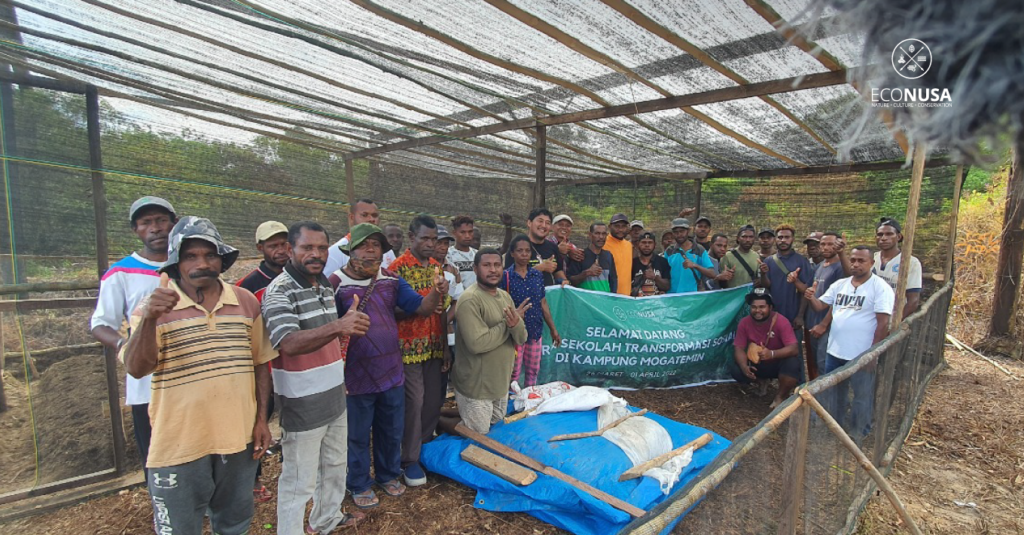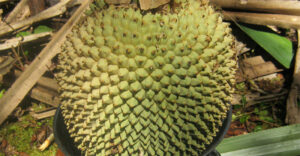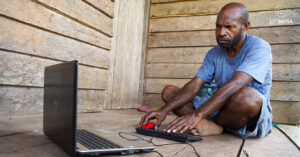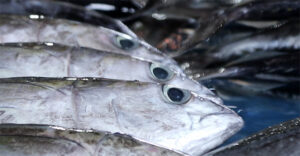
Social Transformation School (STS) at Mogatemin Village in Kais Darat District, South Sorong Regency, was one of the connecting lines of knowledge to the villagers. For instance, in the context of farming, nearly all participants were not familiar yet with organic fertilizer production. On the other side, organic fertilizer has been commonly used by public.
The situation here has made the process of learning and practice of farming group longer than that of the forests and fisheries groups. Safrudin Wahid, the facilitator of the South Sorong Regency’s Agriculture Office, opened the class by delivering theory on organic fertilizer, compost, and their strengths including the required tools and materials.
In this session, Safrudin explained and showed the tools and materials required for the production process of solid and liquid fertilizers. The tools and materials here are subject to change and be adjusted to the available sources in the neighborhood.
Read also: Social Transformation School Officially Opened by South Sorong Regent
The participants of farming class paid their attention enthusiastically and asked some questions on fertilizer production and farming activities. Participants asked on the use of the dung produced goat, chicken, or cow as the raw materials that might be changed by pig dung or fish waste. Could the solvent of EM4 which serves as accelerator of organic fertilizer production be substituted by other medicine? How to create a camp correctly and is safe from flood? How to cope with the problem when the vegetable is infected by germ? What is the ideal size of seeding house?
Almost all questions from the participants were responded directly by Safrudin. However, some were not satisfied by the response and asked the same question even though other participants provided them with simple explanation. “To make it clearer, just wait for the practice,” said Udin, the nickname of Safrudin.
After introducing the tools and materials used for the processing of solid and liquid fertilizer, farming activities were continued in the following day by inspecting directly the seeding and compost house location provided by Mogatemin Village Head. The location was formerly a workshop of heavy duties equipment owned by Korindo company. Korindo once operated in Mogatemin to take trees there.
Read also: STS Participants Questioning Forest Status to South Sorong FMU
There are four locations that were formerly the workshop with iron pillars as the roof and wall supporters. Each block has 8×8 square meters in size. The construction of seeding house and compost only took one block which will be erected side by side to meet the space. The location has been cleaned up from grass and weeds, so the construction process was easily done. Wood and bamboo were available surrounding the construction site. The first thing for the construction is by making wooden structure for seeding and compost house which is estimated to have 4×4 square meters in size.
The main target of second day is seeding and compost house is constructed, and topping is installed by paranet. The participants were divided into two groups. The first was assigned to create a foundation hole and erect wooden structure pillar. Second group seeks extra bamboo and wood for the construction. The early house design was doom to keep the existing soil humidity. However, the participants suggested that the change into slope shape from front to rear with long split bamboo. Up to 16.30 Eastern Indonesia Time, the process has been 70 percent accomplished and stopped due to rain.
Not only rain, the challenge during the construction was also the scorching heat which exhausted the participants and forced them to drink in anticipation of dehydration. The limited carpentry tools were also the challenges as the participants of sago and fisheries classes should use them one after the other.
Read also: Junior High School Graduates Trains Locals on Organic Fertilizer and Grafting
The construction of seeding and fertilizer house was continued on the third day targeting the net cover of the construction and plots for seeding. Besides, they also produced solid and liquid fertilizer so as to provide comprehensive knowledge on the construction or seeding house and utilization of solid and liquid fertilizer.
The construction was commenced by completing the pillar structure and roof by using log, bamboo, and wood to create a door. All participants worked hands in hands to build the house based on their skills.
Safrudin gave appreciation and expressed his pride to all participants in the farming class. Despite the scorching heat, all helped each other to complete their works and enthusiastically took parts along the process.
Read also: Arguni Bawah Community Using Garden Yields for Organic Fertilizer
“I am proud of you. This is remarkable. I think it must not be stopped here, but should go on to give example to the other community,” he said.
Responding to the learning, Yafeth Kontjol from Wersar Village, gave appreciation. As to him, he had never had what was learned from STS Mogatemin before at other place. “I frequently participate trainings for years, but I just got the one like this here,” he said. So, he thanked EcoNusa for providing STS. Yafeth hoped that STS could be done every year so as to make people smarter in natural resources management.
Editor: Nur Alfiyah & Lutfy Putra




